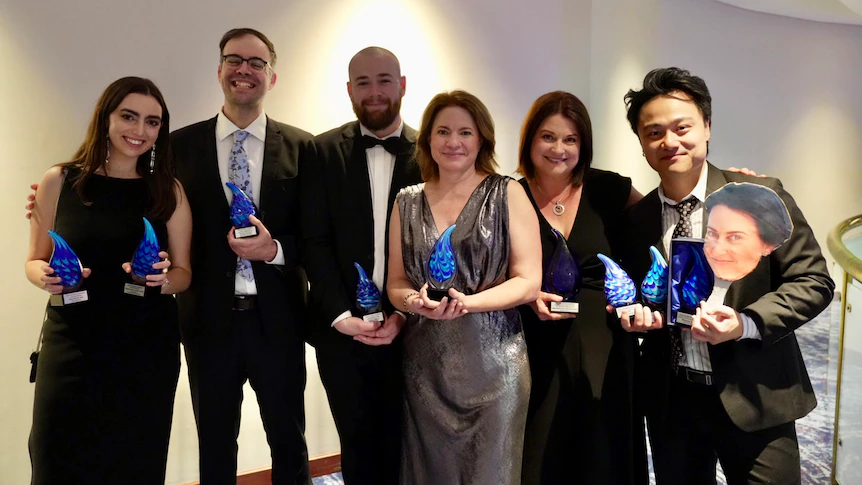Copyright abc

The ABC's coverage of the collapse of Perth builder Nicheliving, WA's 'most vulnerable child' and the state's guardianship system was among the award-winning journalism at the state's media awards. ABC Radio Perth Mornings' presenter Nadia Mitsopoulous and producer Alicia Hanson, along with Geof Parry from Seven West Media's 7 News, have been named the West Australian journalists of the year for their reporting on the downfall of Nicheliving. The Media Entertainment and Arts Alliance's (MEAA) awards was held on Saturday night, with the judges choosing joint winners due to the "combined public impact of this exemplary journalism". "Their tenacious and courageous reporting held powerful figures to account, prompted government intervention and the suspension of the company's licence, ultimately leading to legislative change," a statement from the MEAA said. "Their investigations and compelling use of their respective mediums achieved tangible outcomes and exemplified journalism in the public interest." The ABC's extensive coverage of the Nicheliving building crisis, and the impact on its customers, was led by Hanson and Mitsopoulous with Parry building on that in his reporting for 7 News, which included a confrontation with one of the company's directors. Coverage of the "Niche Nightmare" from Hanson and Mitsopoulous was also recognised through their award in the audio news story category. ABC Radio Perth's content director, Gianfranco Di Giovanni took home the A.H Kornweibel Arts Prize, along with Angus Mackintosh, for their reporting on Australian game developers for Triple J's Hack. Powerful images and rock study revelations ABC Perth investigative reporter, Cason Ho, won the award for best feature photography or photographic essay for his work, Weaponising the State. Ho's images accompanied his reporting on how the guardianship system, meant to care for some of society's most vulnerable people, was being used against them. ABC WA's Chief Reporter, Rhiannon Shine, won the science and environmental award for her story looking into a report on ancient Aboriginal rock carvings on the Burrup Peninsula. Shine spoke to a leading scientist involved in the report who said he had grave concerns about unacceptable interference in the study looking into the impacts of industrial emissions on the petroglyphs. Regional reporters recognised for breadth of work across WA The ABC's Mya Kordic and Esse Deves took home the legal affairs report award for their coverage of an 11-year-old boy, described by a West Australian magistrate as the "state's most vulnerable child". Kordic, who had been in the ABC Broome office before joining the Perth newsroom this year, first reported on the boy in October 2024, when he was released from custody after facing 36 charges, and having spent a total of 77 days in Perth's Banksia Hill Detention Centre. A month later, the 11-year-old was facing 10 new charges, with Kordic reporting the magistrate said she had "significant concerns" for the boy, who was in the care of the Department of Communities. Staying with the story, Kordic and Deves revealed in March the extraordinary news of the then 12-year-old boy, still under state care, having been missing for two weeks. The Kimberley team also took out the top social equity report, which recognises the role of public service journalism related to social and economic equality, human rights and participatory democracy. Dunja Karagic and Kordic's story Turning the Tide won for their powerful piece highlighting a men's behavioural change program in WA's remote Kimberley, a region which holds severe rates of family and domestic violence. The ABC's Erin Parke was again recognised for her regional and community reporting, winning in that category for her coverage of young men vanishing from outback towns in northern WA. Meanwhile, Charmayne Allison and Xavier Martin won the award for best multimedia feature for their story on the Pintupi Nine, a family group who lived in the harsh Gibson and Great Sandy deserts of WA, largely unaware of European colonisation until 1984. Andrew Williams took home the Eaves-Prior-Day Prize award for new journalist or cadet. Williams, who is now based in Esperance, was recognised for several stories including his reporting on the revelation authorities were aware electronic monitoring of alleged violent offenders outside Perth not being possible.



